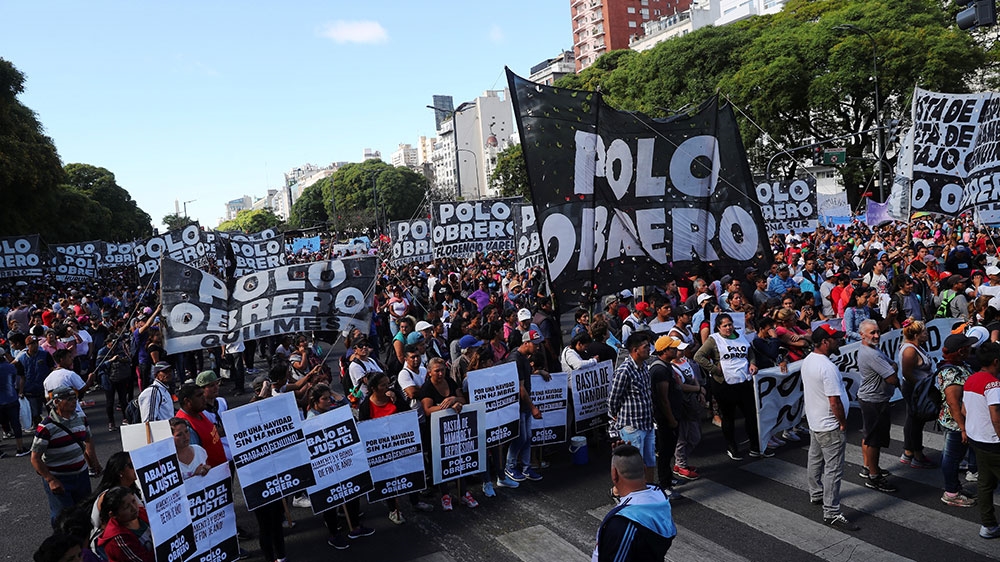
Buenos Aires – Argentine civil society organisations have kicked off a series of actions scheduled for this week against the G20 summit.
“We reject policies which favour large multinationals and imperialist countries and not the people or the rights of nature,” said Beverly Keene, spokesperson for Confluence G20 and IMF Out, which is organising a People’s Summit on Wednesday and Thursday.
The People’s Summit comes ahead of the G20 summit on Friday and Saturday, when leaders of 19 of the world’s largest and most developed countries, as well as the European Union will meet in Buenos Aires to discuss issues including the future of work, infrastructure for development and food security.
Critics say the G20 summit is imperialist and prioritises the interests of big businesses.
Keene said key concerns included the growth of precarious working conditions, extractivism, and the effects of increased use of agricultural technology and chemicals on poor rural communities.
The People’s Summit (La Cumbre de los Pueblos in Spanish) started on Wednesday at the University of Buenos Aires. It aims to provide an open space to discuss ideas for a peaceful and just future. Talks and workshops are being presented by a variety of groups including policy institute the Rosa Luxemburg Foundation, economic and social justice network Latindadd, and environmental activism group Multisectorial Antiextractivista. They will cover topics such as economic justice, the environment, and women’s and children’s rights. Talks are scheduled to continue in the square in front of congress in Buenos Aires on Thursday.
‘The people are the ones affected’
Those who attended the first day of the People’s Summit said it offers an avenue for groups to discuss a wide -range of issues.
Aixa Leguizamon, an activist with the Socialist Workers’ Movement, said the People’s Summit provides an opportunity to meet activists from other countries, such as Brazil, Venezuela and Nicaragua.
“I am absolutely against the existence of groups focused on the exploitation of workers all over the world and of the planet,” she said. “I say that because they are getting together to discuss how to manage the GDP of the whole world. How are they going to do that without the people ending up affected?”
Economists and labour relations experts criticised the G20 for placing infrastructure and telecommunications before basic conditions such as food and security.
They said the growth of work through online platforms such as Uber contributes to precarious working conditions with little worker protection. Julio Godio Institute of the World of Work economist and researcher Sofia Scasserra said working through online platforms led to the so-called “tyranny of the algorithm”.
“You don’t have a boss so you can’t explain why you’re having problems, like if your child is ill or your train is delayed. All you get is a rating,” she said. This problem affects women particularly hard because of the traditional “second shift” of housework and childcare.
 |
| Members of social groups gather to protest against the Group 20 summit, in Buenos Aires [Marcos Brindicci/Reuters] |
Keene expects several thousand people to attend the People’s Summit on Thursday. However, she noted that measures put in place by the government will make it difficult for people to get there. “The government is doing everything it can to convince people to stay at home or leave the city,” she said.
Friday has been declared a public holiday. Trains and the Buenos Aires underground will be suspended on Friday and Saturday, with reduced service on Thursday. During an interview with news channel A24, security minister Patricia Bullrich advised residents to leave the city for the duration of the G20 conference.
Other actions and protests against the summit are expected through Saturday.
The G20 summit comes at a difficult time for Argentina. On November 2, the central bank raised its 2018 inflation forecast to 47.5 percent. The economy is expected to contract by 2.4 percent.
President Mauricio Macri turned to the IMF for a loan in June this year, prompting mass protests in Argentina. The IMF is wildly unpopular with many Argentines because of its role in the severe financial crisis the country experienced in 2001.












